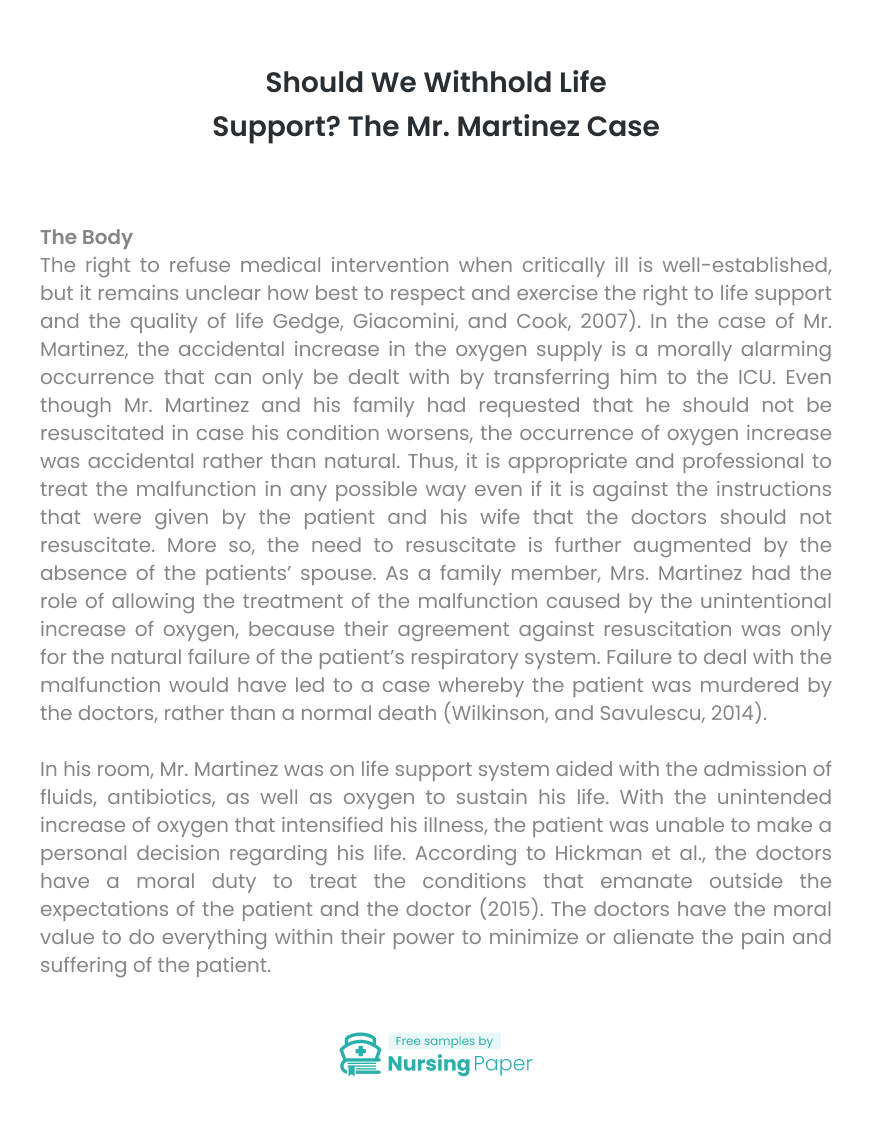
Should We Withhold Life Support? The Mr. Martinez Case
The Body
The right to refuse medical intervention when critically ill is well-established, but it remains unclear how best to respect and exercise the right to life support and the quality of life Gedge, Giacomini, and Cook, 2007). In the case of Mr. Martinez, the accidental increase in the oxygen supply is a morally alarming occurrence that can only be dealt with by transferring him to the ICU. Even though Mr. Martinez and his family had requested that he should not be resuscitated in case his condition worsens, the occurrence of oxygen increase was accidental rather than natural. Thus, it is appropriate and professional to treat the malfunction in any possible way even if it is against the instructions that were given by the patient and his wife that the doctors should not resuscitate. More so, the need to resuscitate is further augmented by the absence of the patients’ spouse. As a family member, Mrs. Martinez had the role of allowing the treatment of the malfunction caused by the unintentional increase of oxygen, because their agreement against resuscitation was only for the natural failure of the patient’s respiratory system. Failure to deal with the malfunction would have led to a case whereby the patient was murdered by the doctors, rather than a normal death (Wilkinson, and Savulescu, 2014).
In his room, Mr. Martinez was on life support system aided with the admission of fluids, antibiotics, as well as oxygen to sustain his life. With the unintended increase of oxygen that intensified his illness, the patient was unable to make a personal decision regarding his life. According to Hickman et al., the doctors have a moral duty to treat the conditions that emanate outside the expectations of the patient and the doctor (2015). The doctors have the moral value to do everything within their power to minimize or alienate the pain and suffering of the patient. Therefore, the accidental increase of oxygen gives the doctors a right to resuscitate the patient and ignore the DNR, so as not to violate human morality (Wilkinson, and Savulescu, 2014).


Physicians have the responsibility to apply their expertise in making sure that the patient recovers quickly and comfortably. Thus, limiting life support for the patient, in this case, is not an option, because it will be against the doctors’ professional etiquette. From the patients’ quality of life, he was doing ok with the admission of fluids and antibiotics, meaning that his condition would have stayed the same if not for the accident. Therefore, the doctors have the obligation of treating the patient until he retains his initial condition. Withholding the life support would violate ethical standards of the physicians (Gedge, Giacomini, and Cook, 2007).
Mr. Martinez should be treated by the doctors even if it violates the wishes of his family. The treatment should be done because the patient was in a stable state prior to the accident. Ethically, the consideration of the treatment is justified by the fact that the doctors have the expertise restore the patient to the state he was in before the illness worsened. Legally, the physician has the right to treat the patient because they are capable of reversing the current situation. If the doctors do not reverse the patients’ conditions, then his death will be considered as an act of murder. Therefore, the doctors are justified to treat the patient so as to ensure that he has quality life (Gedge, Giacomini, and Cook, 2007).
1. Gedge, E. and Giacomini, M., and Cook, D. (2007). Withholding and withdrawing life support in critical care settings: ethical issues concerning consent. Journal of Medical Ethics 33(4): 215-218.
2. Hickman, S. E., Keevern, E., & Hammes, B. J. (2015). Use of the Physician Orders for Life-Sustaining Treatment Program in the Clinical Setting: A Systematic Review of the Literature. Journal of the American Geriatrics Society, 63(2), 341-350.
3. Wilkinson, D., & Savulescu, J. (2014). A Costly Separation between Withdrawing and Withholding Treatment in Intensive Care. Bioethics, 28(3), 127-137.



The download will start shortly.

The download will start shortly.
 Subject:
Medicine
Subject:
Medicine  Number of pages: 5
Number of pages: 5  Subject:
Medicine
Subject:
Medicine  Number of pages: 2
Number of pages: 2  Subject:
Nursing
Subject:
Nursing  Number of pages: 3
Number of pages: 3  Subject:
Health and Social Care
Subject:
Health and Social Care  Number of pages: 10
Number of pages: 10  Subject:
Nursing
Subject:
Nursing  Number of pages: 3
Number of pages: 3  Subject:
Nursing
Subject:
Nursing  Number of pages: 5
Number of pages: 5  Subject:
Health and Social Care
Subject:
Health and Social Care  Number of pages: 4
Number of pages: 4  Subject:
Nursing
Subject:
Nursing  Number of pages: 8
Number of pages: 8  Subject:
Nursing
Subject:
Nursing  Number of pages: 5
Number of pages: 5  Subject:
Nursing
Subject:
Nursing  Number of pages: 2
Number of pages: 2  Subject:
Nursing
Subject:
Nursing  Number of pages: 2
Number of pages: 2  Subject:
Medicine
Subject:
Medicine  Number of pages: 7
Number of pages: 7  Subject:
Health and Social Care
Subject:
Health and Social Care  Number of pages: 5
Number of pages: 5  Subject:
Medicine
Subject:
Medicine  Number of pages: 5
Number of pages: 5  Subject:
Health and Social Care
Subject:
Health and Social Care  Number of pages: 5
Number of pages: 5 
